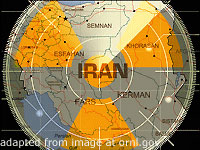NEWSLINK: Russia nuclear envoy makes snap visit to Iran

(Russia nuclear envoy makes snap visit to Iran – AFP – November 15, 2012 – click here for full article)
AFP covers a visit to Tehran by Russian nuclear envoy Sergei Ryabkov:
Ryabkov, who is also deputy foreign minister, met Saeed Jalili, who said Tehran “hopes for a swift return of the P5+1 countries to the negotiating table,” the official news agency IRNA reported.
The recognition of Iran’s right to enrich uranium “cannot be a precondition for talks but will be one of the topics of discussion,” Ryabkov said, according to ISNA, another Iranian agency.
Ryabkov’s visit came three days after he was quoted as telling Britain’s Financial Times newspaper that Moscow would support direct talks between Iran and the United States on Tehran’s disputed nuclear programme.
However, Iranian Foreign Minister Ali Akbar Salehi responded Monday by saying any “decision on comprehensive, bilateral political talks between the two countries… is up to the supreme leader,” Ayatollah Ali Khamenei.
Multilateral talks over the Iranian nuclear program look to start up again”
Salehi, meanwhile, expressed hope that negotiations on its nuclear programme with the so-called P5+1 — the UN Security Council’s five permanent members plus Germany — would resume soon.
The P5+1 has for years sought through negotiations with Iran to defuse an international crisis over Tehran’s atomic ambitions, which the West believes has military aims despite repeated denials by the Islamic republic.
The last high-level talks, which all but failed, were held in Moscow in June.
According to Salehi, Jalili and EU foreign policy chief Catherine Ashton, who represents the world powers in the talks, are to hold a telephone conversation “to decide on a venue and date”.
The UN atomic watchdog has said it will hold a new round of talks in Tehran on December 13.
The Security Council has imposed four sets of sanctions on the Islamic regime, which coupled with unilateral Western restrictions on its oil sector and banks, have begun to cause major problems for its economy.
